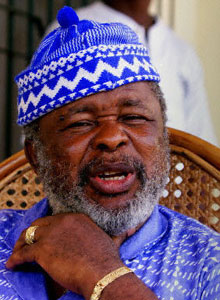Foday Sankoh facts for kids
Foday Saybana Sankoh (born October 17, 1937 – died July 29, 2003) was the person who started the Sierra Leone rebel group called the Revolutionary United Front (RUF). This group was supported by Charles Taylor from Liberia. The RUF was involved in the 11-year-long Sierra Leone Civil War, which began in 1991 and ended in 2002. During this war, about 50,000 people lost their lives, and over 500,000 people had to leave their homes and move to neighboring countries.
Quick facts for kids
Foday Sankoh
|
|
|---|---|
 |
|
| Vice President of Sierra Leone | |
| In office 1999 – 17 May 2000 |
|
| Preceded by | Albert Joe Demby |
| Succeeded by | Albert Joe Demby |
| Personal details | |
| Born | October 17, 1937 Masang Mayoso, Tonkolili District, British Sierra Leone |
| Died | July 29, 2003 (aged 65) Freetown, Sierra Leone |
| Political party | Revolutionary United Front |
| Profession | Rebel, Soldier |
| Ethnicity | Temne (patrilineal) Loko (matrilineal) |
| Military service | |
| Allegiance | |
| Branch/service | Sierra Leone Armed Forces |
| Years of service | 1956–1971 |
| Rank | Corporal |
| Battles/wars | |
Contents
Foday Sankoh's Early Life
Foday Sankoh was born on October 17, 1937. His birthplace was a small village called Masang Mayoso. This village is in the Tonkolili District in the northern part of Sierra Leone. His father was from the Temne group, and his mother was from the Loko group. Sankoh's father was a farmer.
Sankoh went to primary and secondary school in Magburaka, also in the Tonkolili District. After school, he worked at different jobs in Magburaka. In 1956, he joined the Sierra Leone army. He received special training in Nigeria and the United Kingdom. In 1971, when he was a corporal in the army, he was removed from his position. He was then put in prison for seven years at Pademba Road Prison in Freetown. This happened because he was involved in a rebellion against the army's leaders.
After he was released from prison, he worked as a traveling photographer. He moved around the southern and eastern parts of Sierra Leone. During this time, he met some young people who wanted big changes in the country.
Sankoh, along with his partners Rashid Mansaray and Abu Kanu, started looking for people to support an armed fight. Their goal was to remove the government at that time, known as the APC government. They then traveled to Liberia. There, they continued to find more people to join their cause. They also worked with Charles G. Taylor's group, the National Patriotic Front of Liberia.
Starting the Sierra Leone Civil War
On March 23, 1991, the RUF group, led by Foday Sankoh, began its first attack. They were supported by Charles Taylor. The attacks happened in villages in Kailahun District. This area is in the diamond-rich Eastern Province of Sierra Leone.
The RUF became known for its very harsh actions during the civil war. Sankoh himself gave orders for many operations. One of these was called "Operation Pay Yourself." This encouraged his soldiers to take anything they could find from people. When Kanu and Mansaray complained about these methods, they were killed.
In March 1997, Sankoh went to Nigeria. There, he was placed under house arrest and later put in prison. While Sankoh was imprisoned, from 1997 to 1999, Sam Bockarie took over as the RUF's main military leader. During the ten-year war, Sankoh broke several promises to stop fighting. These promises included agreements like the Abidjan Peace Accord and the Lomé Peace Accord signed in 1999. Eventually, the United Kingdom and ECOMOG (a West African peacekeeping force) sent their own small but skilled military forces. With their help, the RUF was finally defeated.
Arrest and Legal Action
Sankoh was arrested on May 17, 2000. This happened after his soldiers shot and killed 19 people. These people were protesting outside his Freetown home on May 8, 2000. One of the people killed was a journalist named Saoman Conteh. His arrest led to big celebrations all over Sierra Leone.
Sankoh was then handed over to the British authorities. A special court, supported by the UN, was set up to deal with his case. He was accused of many serious crimes. These included using child soldiers and other terrible actions against people.
His Final Days
Sankoh passed away in a hospital on July 29, 2003. He had suffered from a stroke and was awaiting his trial. David Crane, the chief prosecutor for the UN-backed war crimes court, made a statement. He said that Sankoh's death gave him "a peaceful end that he denied to so many others." He was buried in his hometown of Magburaka, in the northern part of Sierra Leone.
See also
 In Spanish: Foday Sankoh para niños
In Spanish: Foday Sankoh para niños
 | Leon Lynch |
 | Milton P. Webster |
 | Ferdinand Smith |

